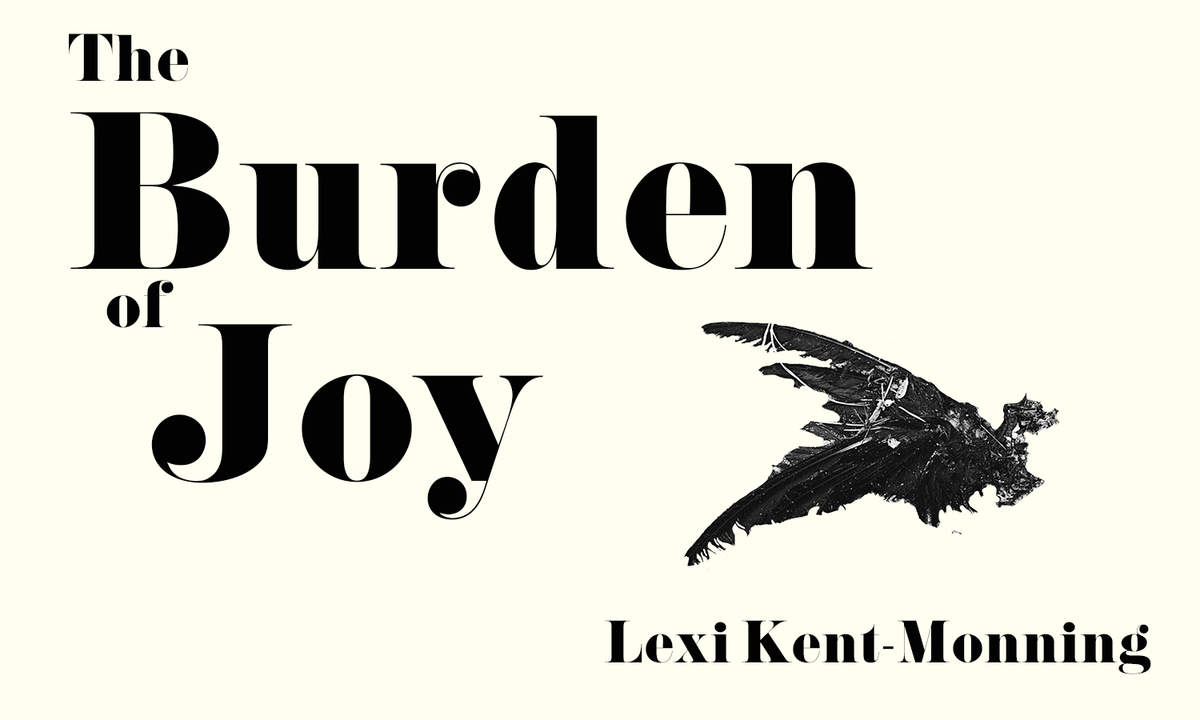Review: Burden of Joy (by Lexi Kent-Monning)
Kent-Monning has the rare gift of transmitting raw, bodily experience to her reader.

Years ago I found myself hate-watching the film adaptation of Eat Pray Love. I spewed cheap merlot and goldfish crackers at the TV while Julia-as-Liz traipsed around Italy and India and Indonesia in search of post-divorce enlightenment, whose peak insight lands as a saucy monologue giving women permission to eat pizza. A quick internet search was validating—turns out Liz got a metric fuckton of money from her publisher to travel, and Bitch Media summarized my irritations about that better than I could.
What, I seethed, would this story look like for those who don’t have $200,000 advances to fund an exercise in getting our spiritual shit together? You know, the rest of us?
Lexi Kent-Monning’s Burden of Joy finally feels like a substantive answer. Burden is a visceral look at the messy aftermath too-often glossed over in major-market memoirs. Placing it squarely in the divorce-lit camp feels reductive; it’s a book that ruthlessly examines relationship to self, as much as others.
Billed as autofiction, Burden of Joy opens on the narrator’s realization that she has lost her husband to another woman (and a California commune) then lurches through the subsequent emotional wreckage. We follow the narrator’s reflections on her strained marriage, the silences of its dissolution, and the exhilarating but fractured love affair she embarks on in its wake. Kent-Monning eschews traditional structures for a story told in flashes and impressions. Nothing here is tidy, or linear—but it is exactly how it feels to process a breakup in real time.
Burden of Joy is achingly interior. It’s a testament to the strength of Kent-Monning’s prose that I had to read it in increments. We soak in a grief so palpable it permeates every page, intensifying as the narrator casts menstrual blood spells that backfire, catalogs dead animals with her camera, bleaches her hair, sustains herself on alcohol. We feel the same flicker of renewal that she does as she collides with a new lover, savoring every drug-fuelled sexual exploit and unguarded intimacy. Dread settles in our bones as we realize she’s being kept on the periphery of not just one man’s life, but two.
Kent-Monning has the rare gift of transmitting raw, bodily experience to her reader. Much of the book is grounded in the narrator’s sensory detail, which explodes each passage. Sometimes the senses teeter with sexual joy, sometimes they sour with malady—always we feel them keenly as the narrator does. Always we understand that pouring ourselves into another will only leave us empty and estranged from self. Female readers will recognize that Burden of Joy is ultimately a caregiver’s lament:
The nurturers never become the nurtured. When we need it, it doesn’t come. I need it now, but nobody knows what to do. They love to tell me how strong I am, as though staying alive is so brave [...] But there is no choice.
In one particularly gutting passage, the narrator fantasizes about all the ways her ex-husband would have been the perfect dad: “he’ll prioritize them in a way he could never prioritize me.” Burden bears unflinching witness to all the ways we abandon ourselves for others, only to claw our way back into our bodies and minds when they abandon us.
Kent-Monning’s narrative bounces around the continental U.S., but the story’s soul lives and breathes in the hot, messy in-between: sweaty bed sheets to emergency rooms, empty beaches to crowded parties. Burden refuses the notion of destination because grief isn’t an Instagrammable journey, nor does it have a natural end. The narrator wraps her story surveying the New York skyline, observing her stubborn refusal to change:
I perform love frantically, a step ahead of what’s asked for. Now I know not to do this, but I don’t know how to stop my nature. Natural selection will leave me behind not performing love correctly and never evolving past it. I just want to be a joy and not a burden.
Everywhere we go, we drag our mess with us. We refuse to learn our lessons. Life doesn’t provide clean endings, and the book is better for refusing to give one to us. Honoring the ache demands honesty. Burden of Joy gives it in unrelenting spades. This is a story for the rest of us, for the ones who can’t spend our way through grief, who can’t eat our way through heartbreak, who can’t pray our shadows away. Thank fuck someone finally told it.
You can order Burden of Joy from Rejection Letters here.
Kirsti MacKenzie is editor of Major 7th Magazine and has published in Autofocus, Bullshit Lit, Maudlin House, and Rejection Letters. She lives in Ottawa and can be found perpetually on her bullshit @KeersteeMack.



